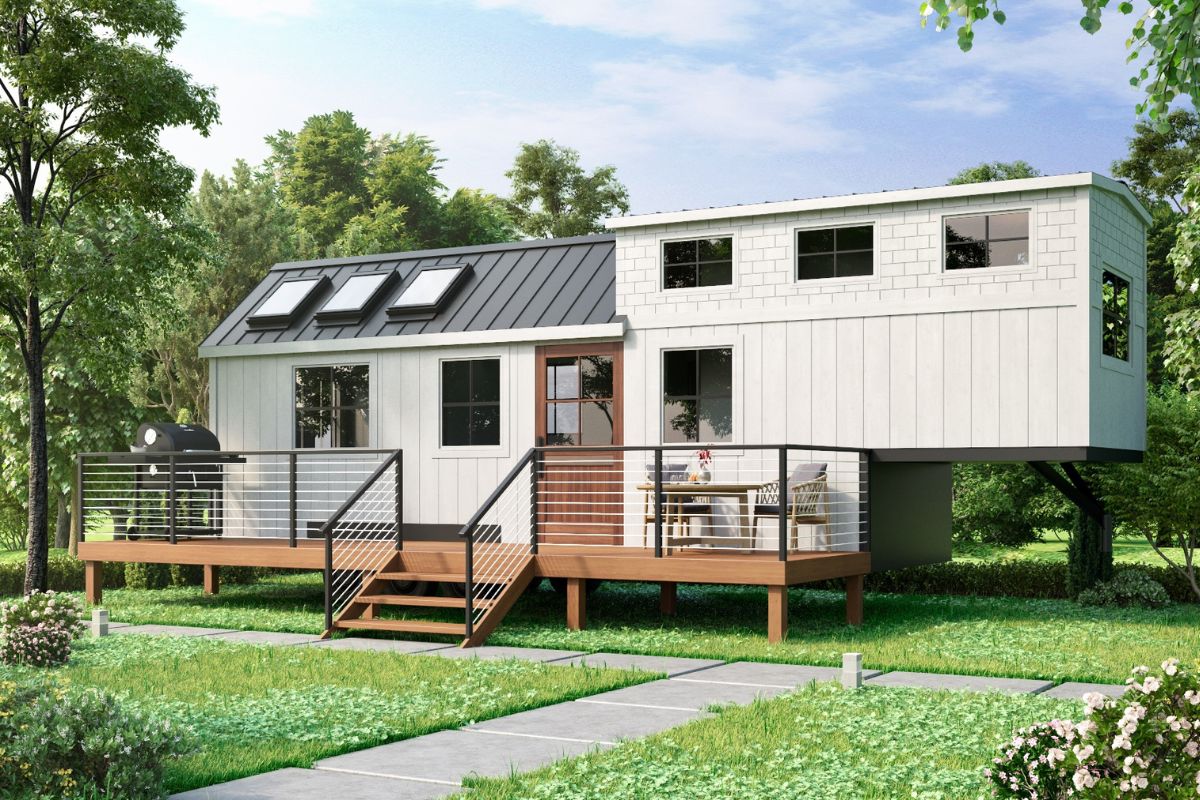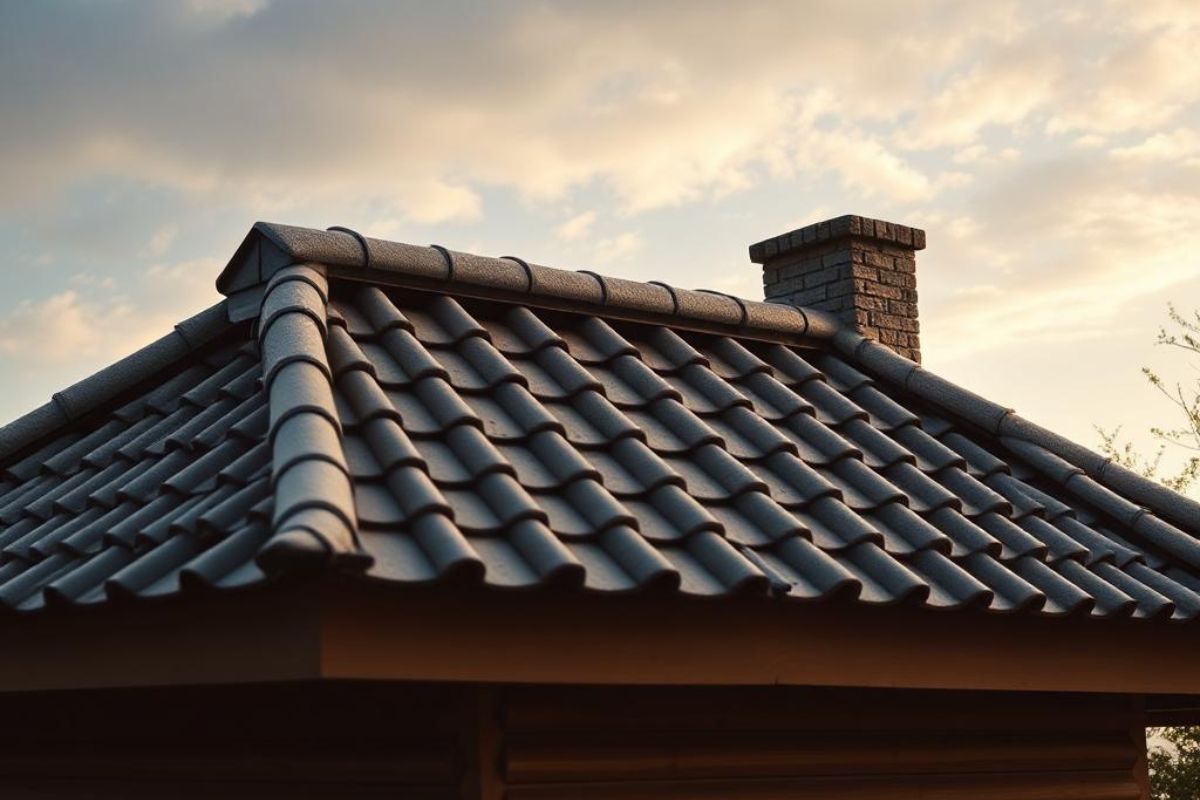.png)
Tiny House Plans: Tiny Homes with Porches
Want to build your own? Here are tiny house plans for tiny homes with porches.
Rustic Wood Porches
Rustic wood porches bring an enduring charm and warm, welcoming vibe to tiny homes. Imagine stepping onto your porch, greeted by the rich, earthy scent of cedar or pine. These porches offer a perfect blend of natural beauty and functionality.
They're not just about aesthetics; they extend your living space and provide a cozy spot for morning coffee or evening relaxation.
To create a rustic wood porch, choose reclaimed or sustainably sourced wood. This echoes the eco-friendly ethos often associated with tiny homes. You can improve the rustic feel by incorporating elements like rough-hewn beams, vintage lanterns, and comfortable, weather-resistant furniture.
Don't forget to add personal touches like potted plants or a woven rug to make the space truly yours.
Maintenance is key to ensuring your rustic wood porch remains beautiful and durable. Regularly clean the wood to prevent dirt buildup and apply a protective sealant to guard against weather damage.
With a little care, your porch will stay inviting and sturdy for years to come.
In essence, a rustic wood porch isn't just an addition to your tiny home; it's an extension of your lifestyle, offering both charm and practicality.
Modern Minimalist Designs
Modern minimalist designs bring a sleek, sophisticated look to tiny home porches, embracing the mantra that less is more.
By focusing on simplicity and functionality, you can create an inviting space without the clutter. Start with a neutral color palette—think whites, greys, and blacks. These hues provide a clean backdrop and make your porch feel more spacious.
Incorporate streamlined furniture pieces like a small bistro set or a minimalist bench. Opt for materials like metal, glass, and concrete to maintain a modern aesthetic. Avoid overly ornate decorations; instead, choose a few well-placed accessories like a single potted plant or a geometric outdoor rug to add character.
Lighting plays an essential role in minimalist design. Use sleek, unobtrusive fixtures like wall-mounted sconces or recessed lighting to keep the look unified. Solar-powered options are both eco-friendly and easy to install.
Don't forget about storage solutions. Built-in benches with hidden compartments can keep your porch tidy and functional.
Cozy Outdoor Nooks
Creating cozy outdoor nooks on your tiny home porch can transform even the smallest spaces into inviting retreats.
Start by selecting comfortable seating that fits your style and space. Consider a small loveseat or a couple of cushioned chairs. Add a soft throw blanket and some outdoor pillows for extra comfort and warmth.
Next, think about lighting. String lights, lanterns, or even a small outdoor lamp can create a warm, welcoming ambiance. Solar-powered options are both eco-friendly and cost-effective. You might also want to incorporate a small table to hold drinks, books, or decorative items.
.png)
Plants can add a touch of nature and serenity to your porch. Choose potted plants that are easy to care for and place them strategically around your seating area. Hanging plants can save space and add vertical interest.
Consider adding a weather-resistant rug to define the space and provide a cozy underfoot feel.
Maximizing Small Spaces
Maximizing small spaces in your tiny home is all about smart planning and creative solutions. Start by utilizing multi-functional furniture. A sofa that converts into a bed or a dining table that doubles as a workspace can save valuable space.
Think vertically; install shelves and cabinets up to the ceiling to keep your floor space clear.
Consider built-in storage options. Benches with hidden compartments or stairs with storage drawers can efficiently use otherwise overlooked areas. Opt for sliding doors instead of traditional ones to free up room and prevent obstructing pathways.
Embrace minimalism. Keep only what you need and love, and regularly declutter to maintain a sense of openness. Choose light colors for walls and furniture to create an illusion of a larger space.
Mirrors can also make rooms feel bigger by reflecting light and expanding visual boundaries.
Use every nook and cranny. Corners, under-beds, and high shelves can be perfect for extra storage.
Finally, don't underestimate the importance of good lighting; well-placed lights can open up your space, making it feel airy and inviting.
With these strategies, your tiny home will be both functional and charming.
Decorative Elements
In relation to decorating your tiny home, every element counts. Start by selecting a color palette that reflects your personality but also keeps the space feeling open and airy. Light colors, such as whites, pastels, and soft grays, can make your small space feel larger and more inviting.
Next, think about wall décor. Opt for pieces that add character without overwhelming the space. Mirrors are fantastic for creating the illusion of more room, while also serving as stylish wall art. Floating shelves can display your favorite trinkets without taking up precious floor space.
Consider your window treatments carefully. Light, airy curtains or blinds can improve natural light, making your tiny home feel brighter and more expansive.
Plants are another excellent addition. They bring life and color, and many varieties thrive in small spaces. Think about hanging planters or small potted plants on shelves.
Lastly, don't forget about your porch. A cozy rug, potted plants, and string lights can transform it into an inviting extension of your indoor space.
Every decorative choice should blend functionality with personal style, making your tiny home uniquely yours.
Multi-Functional Furniture
While you've got the decor nailed down, let's move on to another key aspect of tiny home living: multi-functional furniture. In a compact space, every piece needs to serve more than one purpose. Think about investing in a sofa that doubles as a guest bed or a coffee table with hidden storage. These smart solutions maximize your limited square footage without sacrificing style.
Consider a dining table that can fold away when not in use, freeing up valuable floor space. Wall-mounted desks are another great option, providing a workspace that can be tucked away when you're done. Additionally, look for ottomans or benches with storage compartments. These can store everything from blankets to books, keeping your tiny home clutter-free.
Don't forget about vertical space. Shelves with built-in hooks or pegboards can hold kitchen utensils, tools, or decorative items, making the walls work harder for you. Murphy beds are also a fantastic choice, folding up to free up space during the day.
When selecting multi-functional furniture, prioritize pieces that are both practical and aesthetically pleasing. By doing so, you'll create a tiny home that's efficient, stylish, and perfectly suited to your needs.
Seasonal Adaptations
How can you make your tiny home comfortable all year round? Start with insulation. Properly insulating your tiny home guarantees it stays cozy in the winter and cool in the summer. Choose high-quality materials like spray foam or rigid foam boards to maximize efficiency.
Next, consider your windows and doors. Double-glazed windows are excellent for maintaining temperature control. Add weather stripping to doors to prevent drafts. For the summer months, install a retractable awning or porch shades to keep the sun's heat at bay.
.png)
Heating and cooling systems are essential. A mini-split HVAC system provides both heating and cooling without taking up much space. A wood-burning stove can add charm and warmth during colder months.
For the warmer season, ceiling fans and portable air conditioners can be very effective.
Don't forget about ventilation. Proper airflow helps control humidity and keeps your tiny home feeling fresh. Install vents or a small exhaust fan to guarantee good air circulation.
Sustainable Materials
Building your tiny home with sustainable materials not only benefits the environment but also improves your living experience. By choosing eco-friendly options, you're creating a healthier space for yourself and reducing your carbon footprint.
Start with reclaimed wood for your porch and interior. Reclaimed wood not only looks charming and rustic, but it's also a great way to reuse resources.
Bamboo is another excellent choice. It's a fast-growing, renewable resource that's both durable and stylish.
For insulation, consider using sheep's wool or recycled denim. These materials provide excellent thermal performance and are free from harmful chemicals.
They'll keep your home cozy in winter and cool in summer.
Opt for low-VOC (volatile organic compounds) paints and finishes. These products release fewer pollutants, ensuring better indoor air quality.
Your home will smell fresh without the chemical undertones.
Solar panels are an investment worth making. They capture the sun's energy to power your home, reducing reliance on non-renewable energy sources.
Pair them with energy-efficient appliances to maximize savings and sustainability.
Lastly, don't forget about water conservation. Install low-flow fixtures and consider a rainwater harvesting system.
These steps will help you minimize water waste and make your tiny home truly sustainable.
Conclusion
Incorporating these design tips will transform your tiny home with a porch into a charming, functional haven. Welcome rustic wood for warmth, modern minimalist designs for a sleek look, and cozy outdoor nooks for relaxation. Maximize every inch with multi-functional furniture and seasonal adaptations for year-round comfort. Don't forget sustainable materials to keep it eco-friendly. Your tiny home can be both stylish and practical, offering a delightful blend of comfort and efficiency. Enjoy your beautifully optimized space!






Share: